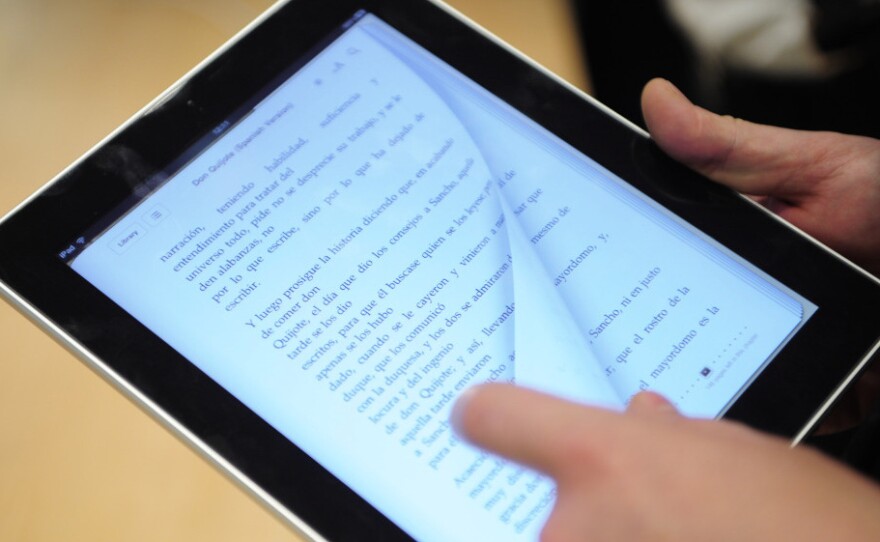
Apple Inc. "conspired to raise the retail price of e-books," a federal judge ruled Wednesday as a civil lawsuit brought by the Justice Department reached its conclusion.
As Bloomberg News reminds its readers, "the U.S. sued Apple and five publishers in April 2012, claiming the maker of the iPad pushed publishers to sign agreements letting it sell digital copies of their books under what's known as the agency model. Under that model, publishers, and not retailers, set prices for each book, with Apple getting 30 percent."
In December 2011, news editor Sarah Weinman from Publishers Marketplaceexplained the Justice Department's concerns to NPR's Lynn Neary. From an "investigative body's standpoint," she noted, "just the very idea that there could be this uniform price might send up some red flags."
According to The Associated Press:
"In her ruling U.S. District Judge Denise Cote said Apple knew that no publisher could risk acting alone to try to eliminate Amazon.com's $9.99 price for the most popular e-books so it 'created a mechanism and environment that enabled them to act together in a matter of weeks to eliminate all retail price competition for their e-books.' "
Cote also wrote that "the evidence is overwhelming that Apple knew of the unlawful aims of the conspiracy and joined the conspiracy with the specific intent to help it succeed."
During the trial, Apple attorney Orin Snyder said the judge would set a "dangerous precedent" if she concluded that Apple manipulated e-book prices.
The Wall Street Journalcalls Wednesday's ruling "a stern rebuke" for Apple. It notes that the five publishers Apple was accused of colluding with "have all since entered into settlements with the Justice Department, as well as in a separate lawsuit by a group of state attorneys general. But Apple refused to settle and decided to go to trial."
Apple, the Journal adds, "argued at trial that it engaged in hard-fought negotiations with the publishers and denied that it engaged in any collusion."
Judge Cote has not yet assessed damages.
Update at 2:15 p.m. ET. Consumers Won't See Much On An Effect.
Laura Hazard Owen, who "covers book publishing, paywalls and magazines for GigaOM," writes that:
"Consumers are likely to see few pricing changes when they are shopping for ebooks, because all five publisher defendants have already settled in the case and agreed to modified agency pricing agreements that forbid them from restricting retailer discounting for two years. Amazon and other retailers have been discounting books for months. Amazon could get more aggressive about price cutting, however."
Update at 10:40 a.m. ET. The Ruling:
We've put a copy of the judge's ruling here, and in the box below. Click on the title to pop up a larger view.
Update at 10:20 a.m. ET. "Victory For Millions Of Consumers," Justice Says; Apple Plans To Appeal:
"This result is a victory for millions of consumers who choose to read books electronically," Assistant Attorney Gen. Bill Baer writes in a statement e-mailed to reporters. "After carefully weighing the evidence, the court agreed with the Justice Department and 33 state attorneys general that executives at the highest levels of Apple orchestrated a conspiracy with five major publishers -- Hachette, HarperCollins, Macmillan, Penguin and Simon & Schuster -- to raise e-book prices. Through today's court decision and previous settlements with five major publishers, consumers are again benefiting from retail price competition and paying less for their e-books."
Meanwhile, Apple spokesman Tom Neumayr says:
"We did not conspire to fix e-book pricing and we will continue to fight against these false accusations. ... We've done nothing wrong and we will appeal the judge's decision."
Copyright 2013 NPR. To see more, visit www.npr.org.






